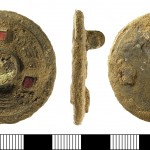An Early Medieval silver-gilt disc brooch, now in the care of the Isle of Wight Heritage Service. Both the finder and landowners waived their right to a reward in this case IOW-A33D42

An Early Medieval silver-gilt disc brooch, now in the care of the Isle of Wight Heritage Service. Both the finder and landowners waived their right to a reward in this case (ref. IOW-A33D42)
Finds reported under the Treasure Act and recorded with the Portable Antiquities Scheme are occasionally acquired by museums at reduced or no cost, thanks to the generosity of finders and landowners. It is fitting to highlight these finds and to thank those individuals who have foregone a financial reward in order to see the finds in a museum collection where they can be studied and enjoyed by all. Each year, almost 10% of finds reported as potential Treasure are donated to museums, which is a great statistic. We’ll be trying to keep this blog updated periodically with recent donations as they are made.
How are donations made? Finds which meet the criteria for ‘Treasure’ under the Treasure Act may be claimed by the Crown and placed in an appropriate museum. That museum is required to pay a reward to the finder and landowner equal to the market value of the find, but the finder and landowner can elect to waive their reward, thus enabling the museum to acquire the find without resorting to public expense. We refer to these acts as ‘donations’.
Most of the finds recorded with the Portable Antiquities Scheme are not Treasure, but a museum may nonetheless be interested in acquiring them. A Finds Liaison Officer or National Finds Advisor may recognise an item’s significance and speak to a museum curator about the item; if the museum curator wishes to acquire the find, they can be put in touch with the finder/landowner. The finder/landowner may then choose to donate the find to the museum if they wish.
Private collections Many finders have built up their collections of archaeological finds over the years, and it is worth thinking about a long-term home for this material when the owner passes on. Museums may be willing to accept the material as a donation and it is advisable to discuss this possibility when the opportunity arises – before it’s too late!
Questions? If you have any questions about donations, or if you are considering donating your find, speak to your local Finds Liaison Officer or the Treasure Team at the British Museum (treasure@britishmuseum.org).